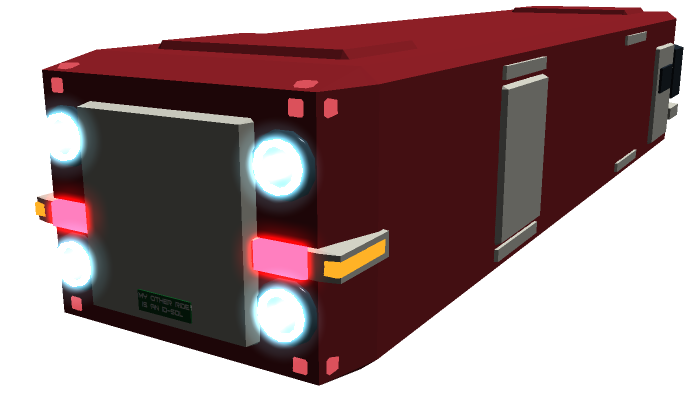Sidebar
Table of Contents
Plasma Projection System
The Plasma Projection System is a multi-function system produced by the Sunflower Corporation that acts as an STL engine, vernier system, and defensive weapon system for low-cost civilian space vessels. It was designed in YE 40 by Kage Yaichiro.
Hauler-class Logistics Ship with Plasma Projection System on the rear.
History and Background
When designing the Hauler-class Logistics Ship in YE 40, Kage Yaichiro was attempting to find the most cost-effective, simple, and robust system he could while still affording suitable maneuverability for a small civilian craft. His experience with Star Army of Yamatai craft meant that he was well aware of how similarly plasma propulsion and weapon systems worked. Realizing that he could integrate the two and in doing so solve both problems at a low cost, he elected to design the Plasma Projection System.
About the Plasma Projection System
The Plasma Projection System is a cost-effective and stable way to have the Hauler-class Logistics Ship and other vessels be capable of changing orientation and propelling themselves. These components are usually fusion-powered, but it is possible to filter plasma from an Aether Generator to power them if needed. The Plasma Projection System consists of a series of interconnected systems across the ship which transport and deploy plasma for various purposes. The parts that project plasma tend to glow a dull red when primed and emit a white-blue plasma when employed. All engines and verniers are capable of employing basic thrust vectoring for fine control simply by modulating and adjusting the magnetic containment field that manages the exhaust. This is also used to weaponize the plasma into cohesive beams and direct them at enemies.
Plasma Engine
The Plasma Engine is a magnetic containment field-lined exhaust that accelerates plasma out of the back of the craft at relativistic speeds. It can be compared to the chemical rockets of yore, except that it is far faster. It should be noted that if one wants to decelerate at the same rate they've accelerated with these engines, the craft actually has to be rotated 180 degrees and enact a retro-burn; otherwise, they have to conduct a more gradual deceleration with the Plasma Verniers.
Plasma Cannon
When a Plasma Engine employs a large amount of power and turns it into a focused beam with its magnetic containment field, the plasma becomes a weapon discharge capable of damaging an enemy. The power of the weapon varies depending on the size and role of vessel on which it is installed, but it is typically used as a way of firing on an enemy to the rear while retreating rather than to stand and fight.
While variable recoil compensation systems exist for this system, the cannon is typically meant to propel the ship out of harm's way with the recoil while firing at a pursuer. As a result, however, the rear-facing weapons/engines can't aim at an enemy in front of the vessel.
Plasma Vernier
These are miniature versions of the Plasma Engine, though they usually trade power for thrust vectoring capability. Their role is to change the orientation of the vessel, and they are typically placed on the vertexes of the craft for optimum effect. These systems are employed to use the Plasma Gun functionality as well.
Plasma Gun
A smaller version of the Plasma Cannon that operates in the same manner from the Plasma Verniers (via focusing its plasma exhaust into a focused beam), the Plasma Gun is typically a point defense employed against hostile power armor that has a variable output depending on its application. Each ship using this system may employ a different strength depending on its size and role, however.
It should be noted that when fired in this mode, recoil compensation systems are activated to prevent the vessel from being moved as if it were discharging its vernier. The intensity of this recoil compensation system can be modulated for each vernier from 0% to 100% as needed by the computer to allow the use of the Plasma Gun to turn the craft if the use of both gun and vernier functions are required.
Discharge Information
Though their power varies, the PPS' discharge is a blue-white light-speed plasma discharge which can vaporize and provide intense energy and heat. It has similarities in superficial appearance to the Star Army of Yamatai's technology due to the fact that the basic concepts were developed from an engineering understanding borne of Yamataian concepts. However, it is still a civilian and home-grown implementation.
- Muzzle Flash: Not applicable in space; causes shimmering due to heat when used in an atmosphere.
- Retort: When used in an atmosphere, a roar with a secondary hissing component is heard due to the plasma vaporizing gasses it comes into contact with.
- Projectile/Beam Appearance: Bright blue-white beam
- Effective Range 300,000 kilometers1)
- Maximum Range: 900,000 kilometers2)
- Muzzle Velocity: 300,000 kilometers/second3)
- Rate of Fire (Cannon): A single half-second duration beam every three seconds.
- Rate of Fire (Gun): Two 1/10 second beams per second.
- Recoil: Direct recoil corresponding to thruster or vernier-equivalent use; must be compensated for as previously noted.
Energy Source
The equipped vessel's own fusion power source (or Aether if post-processing is done to remove the antimatter and radioactive components) is employed to support the weapon. This provides unlimited power. If the vessel lacks the power to use all of its Plasma Guns at once, the vessel can still selectively fire from the ones it is capable of powering and switch which ones are powered up as needed.
- Ammunition Supplied via the ship's indigenous fusion or Aether power source
- Purpose (Cannon): Damage variable by ship's size and role; typically a primary or secondary weapon.
- Purpose (Gun): Damage variable by ship's size and role; typically point defense.
- Round Capacity: Unlimited when power source is functional and connected.
OOC Notes
Page Tools
Terms of Service - Privacy Policy

